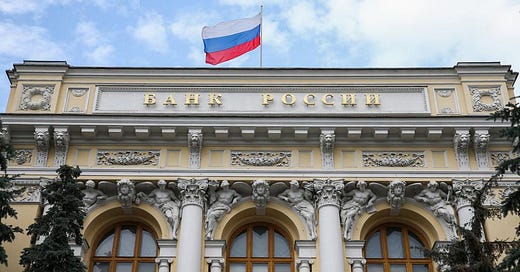Russia: Can Stay Solvent Longer Than You Can Stay Stupid
Why sanctions wont work in the short-term
Yesterday, on Twitter Spaces, my friend Tom Dans pointed out that Russia’s current account grew to new highs this past quarter despite sanctions. This year, NATO and unaligned nations placed further sanctions on Russia after Russia launched its ground invasion of Ukraine. Sanctions, usually a tool of geopolitical pressure and economic conflict, show their shortcomings as a symbolic gesture in the short term.
There are many reasons why Russia is antifragile to this current wave of international and non-military aid pressure. The major one is that Russia is fundamentally a petrostate at heart. While the Russian economy is more diversified than oil and gas, most of its exports reflect its status as a major extractor of oil and gas. Natural gas is an input to fertilizer, which Russia exports a considerable amount across the globe. See the list below:
1. Mineral fuels including oil: US$211.5 billion (43% of total exports)
2. Gems, precious metals: $31.6 billion (6.4%)
3. Iron, steel: $28.9 billion (5.9%)
4. Fertilizers: $12.5 billion (2.5%)
5. Wood: $11.7 billion (2.4%)
6. Machinery including computers: $10.7 billion (2.2%)
7. Cereals: $9.1 billion (1.9%)
8. Aluminum: $8.8 billion (1.8%)
9. Ores, slag, ash: $7.4 billion (1.5%)
10. Plastics, plastic articles: $6.2 billion (1.3%)
The second major issue is that Russia is a secret service with a nation. The siloviks who run Russia are indifferent to human suffering in a way unfamiliar to Westerners. Russia is willing to take an unbelievable amount of pressure. Third, Russia is a leading exporter of wheat and corn, and the world is facing a food shortage. Furthermore, Russia is a country that excels at strategic geopolitical maneuvering. Despite the struggles after the collapse of the Soviet Union, Russia maintained its intelligence and economic connections across the globe.
Despite the sanctions so far, Russia weathers the economic pressure well. Just how well? The Russian Central Bank reported a current account surplus of $58.2 Billion in Q1 of 2022, up from $22.5 in Q1 of 2021. This surplus growth is even with capital outflows of $64.2 Billion in Q1 2022 compared with $17.5 Billion in Q1 2021. This surplus is the largest since 1994 because of the surge in exports and the decline in imports.
What is a current account? It’s the record of a nation’s transactions with the rest of the world. The current account specifically records the net trade in goods and services, net earnings on investments, and net transfer payments. While the number itself is value-neutral, in this context, it means Russia has a lot of money it can blow through, and the money keeps growing.
While there are pros and cons to this for Russia, it has more flexibility than most Western pundits understand. The current account's growth rate could rebuild much of the Central Bank of Russia’s international reserves by the end of 2022. It also gives more flexibility to “de-dollarize” its monetary reserves and foreign trade.
Europe would need to embargo Russian oil and gas and possibly other Russian exports. Given the coming food crisis and eventually the 2022-2023 winter, I don’t think that embargo is likely right now. There’s no foreseeable way Europe can totally displace Russian energy products. The sanctions primarily impact technology and technological goods imports for Russia, which may damage the Russian economy on a long enough time horizon.
Given the Russian character, its relative wealth despite its economic size and poverty problems, Russia is still in a solid position to endure financial and political pressures placed on the country from the Western world. The key to defeating Russia in the Russo-Ukraine Conflict is still in battle, and Ukraine may pull off the upset of the century. Western countries should continue to send lethal aid to Ukraine absent any serious diplomatic overtures on behalf of Russia.
However, one thing is certain is the fundamental Russian misunderstanding by Western military-industrial complexes. America and her allies need to wake up that the arsenal of democracy, while formidable, production is anemic and that geopolitical flashpoints distract from our longer-term interest in securing our nation and its prosperity.




Who would have thought an economy built on fuel and food would be anti-fragile?